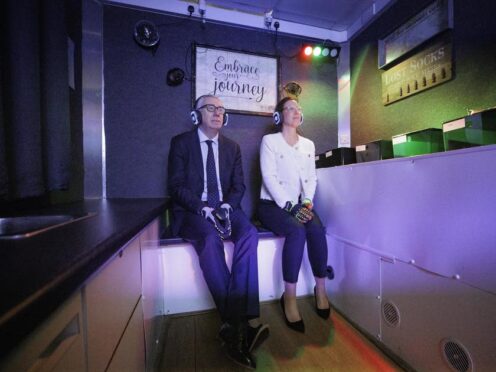
Police in Northern Ireland have had a major learning experience after taking a walk in the steps of those with autism, the chief constable has said.
Jon Boutcher was among 120 officers of the Police Service of Northern Ireland (PSNI) to get a glimpse into the world of the neurologically diverse ahead of Autism Acceptance Week.
The chief constable said those with autism have been “failed” in the past due to a lack of understanding of such conditions.
It came during a visit of the Training 2 Care UK Autism Virtual Reality Experience Bus to Belfast – an initiative developed by those with autism which immerses users through the journey of being brought into custody with flashing lights, noises and sensory aspects such as smells and textures.

Those participating were observed by a trainer who took them through a lengthy debrief afterwards to assess their reactions and explain the reasons for how the experience worked.
While many prison authorities and schools have taken part in it, the PSNI is believed to be the first police force to do so.
Mr Boutcher described it as an “incredible experience”.
He said the PSNI took part in the training because its officers “are here to look after everybody”.
“You can’t do that unless you walk in other people’s shoes from different backgrounds, cultures and disabilities,” he told the PA news agency.
“Autism, Asperger’s, these are conditions that for most of us, are things that we read about in newspapers, but we have to deal with people who are going through crises, and to have an experience such as I have just had, that gives you a very brief glimpse into the world who people who suffer from autism experience, can only help our officers understand what people are going through, that they would otherwise have no clue.

“It was incredibly disorientating, really challenging. It gave us a very brief glimpse into the world that many people have to endure and that will make them better police officers, and help them deal with people who have to go through that every day of their life.”
Mr Boutcher added: “This is something that every police service should be doing around the country. I can honestly say I feel I learn something every day, sometimes that learning experience varies to a degree, today has been quite a big spike in understanding just what people go through.
“I have done some stuff with autism and Asperger’s previously because we failed people with these conditions because we have not understood these conditions so that is why this is so important to do.”
Temporary Superintendent Finola Dornan, who chairs the Police Autism Support Group, said there has been a “phenomenal response” from the officers who went through the training.
“It’s been really positive, they see the value in terms of their policing practice, so that’s hugely important and for us it is really rewarding,” she said.
“With it being Autism Acceptance Week, I hope that people can see the efforts we’re making to better equip our officers to be more accessible and responsive to the autistic community.

“As the Chief Constable has said, we’re here for a really wide diverse range of people, and that’s not easy for frontline practitioners so everybody who have come has been really grateful for the training and has engaged really positively in it. I have no doubt they’ll go back to police stations right across Northern Ireland and put this into practise and share their learning with their colleagues.”
The PSNI has also been working with Autism NI.
The group’s chief executive, Kerry Boyd, said she strongly welcomed the PSNI taking part in the initiative.
“It will benefit them within their role as police officers on the ground, but also as civilians too, their friends, neighbours, family and also work colleagues, being able to understand better how autism affects everyone differently and how it can be overwhelming, and most of all how to support an autistic person,” she said.
“I feel that we have a lot of support within the PSNI already, they have a fantastic support group within it, and it’s really about ensuring that all the police officers have the same training and understanding so that when they come into contact with somebody who has autism, they’re able to understand and support them better.
“Our message for Autism Acceptance Week is really to be kind to different minds. It’s not just about police, everyone in our society needs to take time to understand autistic people better.”

Enjoy the convenience of having The Sunday Post delivered as a digital ePaper straight to your smartphone, tablet or computer.
Subscribe for only £5.49 a month and enjoy all the benefits of the printed paper as a digital replica.
Subscribe